Len asked a question about something in Final Fantasy V that I’ve often wondered about myself:
I was wondering about the old man in FF5 from whom you get the Brave Blade or Chicken Knife. After receiving whichever weapon you choose, the old man turns into a skeleton, clucks like a chicken, and walks away. It’s a surreal scene, but I was wondering: why is he making chicken noises as a skeleton?
So first off, a quick explanation – in the latter half of the game you can meet this hidden old man character in the town of Mua/Moore. Here’s the scene in both the original Japanese Super Famicom version and in the English fan translation:
And here’s a look at the line in question as it appears in a number of different versions of the game:
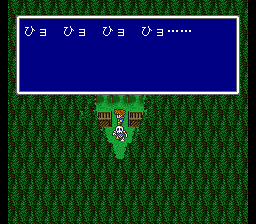 |  |
| Super Famicom | Fan translation |
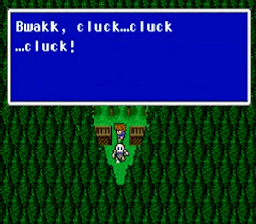 | 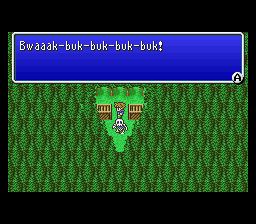 |
| PlayStation translation | GBA translation |
So the question here is why does the guy turn into a skeleton and walk away while making chicken sounds?
He actually doesn’t make chicken sounds in the Japanese text – instead, he has a very unique, unusual laugh. It combines both hiragana and katakana, which gives it an eerie, otherworldly vibe – which makes total sense, given that he’s actually a dead skeleton! Minus that extra vibe to it, this text just sounds like an old man laughing or chuckling. What little I’ve found on the subject on Japanese fan sites seems to agree with this interpretation too, that it’s just the old man laughing.
Because of the oddness of this line, I feel what likely happened is that the PlayStation translator was kind of like, “Umm, I’m not really sure what the heck this is, but I better do something with it.” And since one of the items he gives you is a “Chicken Knife”, the translator was like, “I’ll make him make chicken sounds!”
And, similar to how the Final Fantasy IV PlayStation translation was the basis for the GBA translation, I’m assuming the FFV PlayStation translation served as the base translation for the FFV GBA translation, although I’m guessing the FFV GBA translation had some more polishing done to it. But, in any case, my translator instincts say that’s probably why the chicken sounds exist in the GBA translation too.
Anyway, hopefully that clears up that mystery a little bit! It’s something I’ve wondered about for a long time too, so I’m glad I finally took a look at it!
I’m not sure how other translations handle this line, so if anyone out there has played other versions, let me know in the comments!


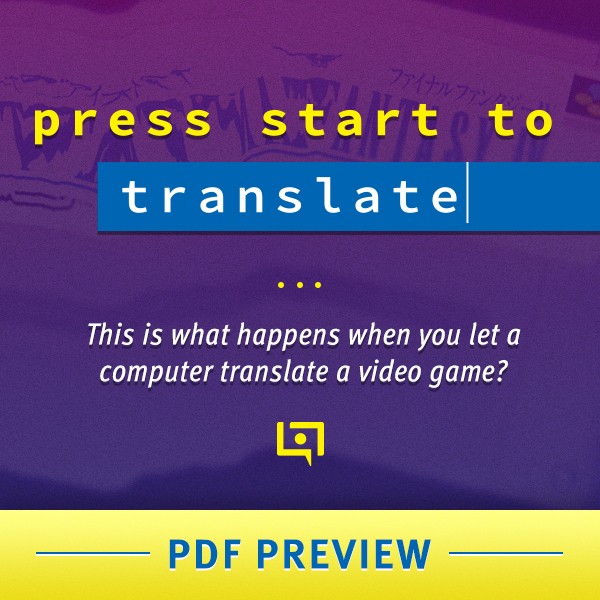
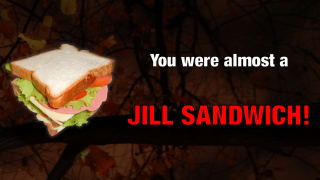
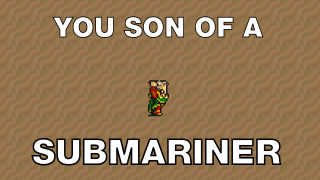
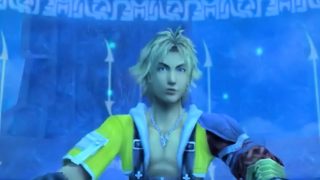
well that’s a very…interesting localization quirk. Perhaps the idea is that he was making fun of you? as in, if you take the coward chest, he’s making fun of you for being a coward, and if you take the bravery chest he’s making fun of you in a ‘you think you’re brae, but you’re actually just a scared little chicken deep down inside’? of course, i may just be lookuing way too deep into this.
Given that the GBA translation is rather silly, it’s an intentional localization choice.
And… the Playstation one isn’t silly? :I
The PlayStation one is UNintentionally silly, with very plain dialogue. The GBA translation is off the rails with loads of puns and jokes. I’d recommend a play just for the dialogue alone.
I offer “HUE HUE HUE…” as a better translation, that’s a creepy laugh :U
How would you pronounce that? At first I thought it was pronounced like the English world “hue”, as in the color thing. Would “Hwe hwe hwe” be closer to what you mean? It does sound kinda interesting, I might steal it for future laughs!
I’ve always been partial to “moohoohahaha” if I need a creepy laugh, but I suppose that’s less of a cackle like you’d expect an old dead corpse to make.
How do you pronounce a mix of hiragana and katakana?
Similar to how you might pronounce a mix of all-caps text and lowercase text I guess. JUSt iN SoME WEirD WAy i gUESs
…That text with the mix of all caps and lowercase suddenly reminds me of Gerogero from Final Fantasy 8. Oh gawd creepiness and bad memories. Damn you, Gerogero! Creepy thing…especially for turning into Seifer’s Gunblade for no good given reason in the Debug Room…argh! So creepy and WEIRD!
Brazilian here. Given that “huehuehue” got infamous by its overuse by obnoxious Brazilian MMO players (sorry!), I think the Portuguese pronunciation would be apropos. It’s literally [‘hu.e] (HOO-eh).
Fufufufu…
Uweeheehee.
Thank you for clarifying!
I’m actually glad that the localization went along with the chicken noises.
The scene would be less memorable without them.
“Piyo” and sometimes “hiyo” (as in hiyoko manju) is the sound of a baby chick, so it seems the translator was reading it that way.
Yeah, that’s the only thing I could come up with myself. I’m not sure who did the PlayStation translation – I’d love to pick their brain someday!
The PlayStation translation is seen by many as poor quality, with the Wyvern’s name mistranslated as “Y-Burn”. Also, they tend to dislike the fact that Faris has a heavy pirate accent that they believe does not fit her character.
The Game Boy Advance translation has none of these things. The Wyvern has the correct name, and Faris has far less of a pirate accent than before.
Because of this, I believe that the PlayStation translation was not used as a base for the Game Boy Advance translation. Both translations are silly for different reasons.
Well, by “basis” I mean that any obvious/well-known mistakes would’ve been fixed during the re-release process, of course. That’s what’s nice about re-releases and ports, after all. That said, I haven’t actually compared the scripts yet, it’s just that this chicken thing reminds me very much of the FFIV PSX->GBA changes I’ve been documenting. But you might be 100% right!
Yeah, I really doubt the PSX translation was used as a basis. If it were, there’s so little of it left that it really doesn’t matter. The GBA version is off the wall, hilarious, full of references and doesn’t take the game seriously at all. And I love it for it, even if it’s not accurate.
Also, the entire PSX script isn’t as bad as that “Y-Burn” string (Ferry Walk is pretty funny, too!). I really think someone handled dialogue and someone else handled all of the terminology. Some of the terminology seems, at least in part, derived from FF6, which makes perfect sense considering the games came bundled together.
I hear at least some of the PSX translaton was overseen by Ted Woolsey (and originates from an earlier point in development, from when Square planned to release the game for PC as “Final Fantasy Extreme”), although it seems to have been inserted before being thoroughly quality-checked. That in mind, it makes sense that it would share some terms with FF6.
So Gramps was basically going “Hiyo hiyo hiyo hiyo” originally? Huh, interesting.
Well, it’s actually “Hyo hyo hyo hyo”.
I didn’t notice that mistake until now. I know I’ve heard some old men in anime laugh like that a few times.
Mato, I have a question, though it’s not about a game: what’s the difference between a translation and a localization? I’ve heard before that a localization adapts cultural references and things such as puns to work on the target language, while translations don’t, but that doesn’t sound very right to me.
That’s actually the topic of an article I’ve been planning to write sometime. The word “lcoalization” can apply to so many things and means a lot of different things for different people, yet it’s all sort of lumped into one word, which makes things kind of confusing. I’ll have an article about it at some point though, especially since it’s in the name of this site 😛
Not nescicarily about Final Fantasy, but… What was with Naruto and the whole “Believe It!” thing? Also, (I’m kinda jumping around, but…) what’s with the whole Dragon Ball Saiyan thing. I’ve heard that it was a mistranslation or that something was localized but I’m not sure what… Could you help me?
About the Saiyan thing, from what I recall in Japanese the word was something like Saiyajin and meant “person from Saiya”. In English one of the way we refer to someone from somewhere is to take the name of the place and add “-an” to the end, such as: Canada – CanadIAN, America – AmericAN, Russia – RussiAN. Going from this, it would make some sense to call a person from Saiya a “SaiyAN”.
I’m not Mato, but in short:
The Naruto thing:
In Japanese, Naruto has this… catchphrase, for the lack of a better word, where he ends a lot of his lines with だってばよ, “datte ba yo”. The English translators wanted to preserve this character trait, so they came up with the English localization “Believe it!”, which gets roughly the same idea across.
However, a rather large amount of internet people had been watching fansubs that completely ignored this catchphrase, thought the dubbers had invented it out of nowhere, and complained endlessly. I never really followed the series all that much, but I believe these endless, uninformed complaints led to the dub dropping the phrase and giving the fan the catchphrase-less character they had been led to believe was closer to the original. Kind of sad if you think about it.
The Dragonball thing:
I’m not entirely sure what you’re referring to here, but… in short, the Dragonball franchise is primarily centered around aliens called サイヤ人, literally saiya-jin. The 人, here pronounced “jin”, means “person”, and when used as a suffix like this means that the full word means “person that has the qualifications of the previous word”. It can be used to denote nationality (like 日本人, nihon-jin, “Japanese person”), or like in this context, race. In other words, these guys are of a race called “Saiya”, making “Saiyan” a logical English translation. Terms like “Saiyish” or “Saiyese” could’ve been used as well, but I think we can all agree “Saiyan” looks better.
Not sure if this is what you wanted to know, but there you have it.
Also worth noting, in re: Dragon Ball: the word “Saiya” is an anagram of “yasai,” which is a Japanese word meaning “vegetables.” Which is why all the Saiyans have vegetable-ish names, and are ruled by a king called Vegeta.
And just to round out the background on that:
* Their enemies on their home planet were called “Tsufurujin”.
* Applying the same “move the first syllable to the end” rule as turns “saiya” back into “yasai” turns that into “Furutsu”.
* Phonetically, that’s the word “fruits”.
WOW! Thanks for answering! I’ve seen pictures on deviantArt or whatever that has Naruto saying “Datte ba yo” or something like that. Now, (I hate to ask so many questions, but…) What was L called in the Japanese version of Death Note (his alias by the way)?
He was called L, still written L but pronounced エル (eru).
Those folks who complained about “Believe it!” were nothing but sub-worshipping idiots. It had been stated numerous times by Kishimoto himself that “datte ba yo” means absolutely nothing in Japanese. It’s just a dorky speech quirk. But did they listen? No. Those whiny complainers were too blinded by their weeabooism to listen and complained nonstop until Viz caved. This is why subtitled anime online should be modded somehow to prevents these audiophile morons from ever watching any of it.
I don’t think there’s anything that can be considered a mistranslation in the *spelling* of Saiyan. Even the original version of Dragon Ball Kai used it for their insert song “Saiyan Blood.” The contention you might have heard about is simply the fact that the English version mispronounces the term. The dub has always pronounced it with a long “a” sound like in “blade,” but it actually contains a long “i” sound like in “eye” or “scientist.”
key skeleton, what are you, chicken, cheep cheep cheep cheep
I think mixing upper and lowercase, even perhaps changing the font size so it gets small then big, would convey that otherworldly feel well enough.
What a shame that Square Enix didn’t even bother retranslating the GBA games…
I cannot access the next article that was just published (incompletely?), the one about Mega Man living in Monsteropolis. Clicking on it returns a 404 error with an NES Legend of Zelda reference directing me to the homepage. I hope it gets fixed soon.
I examined the link, and it appears to be a “p=####” format as opposed to other articles whose links are the articles’ titles entirely lowercase, with punctuation removed, and with spaces replaced by hyphen-minuses.
That’s because it wasn’t ready yet 😛 I gotta fix some coding on the site – right now while I’m working on an update it can sometimes show up as a link elsewhere on the site.
I’ve encountered that too — that’s what was going on that time I carped at you on Tweeter about a link not working. Not a huge deal, certainly, but pretty confusing when you first run into it.
Does anyone know if they changed this in the Android/IOS version of V?
They didn’t, same chicken sounds
It does sort of still sound like a laugh in the GBA version, kind of, maybe, sort of.
At first I mistakenlt read the original Japanese text as “piyo piyo piyo”, ぴョぴョ、thinking there was a handakuten mark in there — and at that I thought the cluck cluck was on point.
But then there’s no handakuten so it’s closer to the otherworldy laugh you said.
But then it made me wonder, could the translators also have seen a ぴョ mistakenly and went from there?